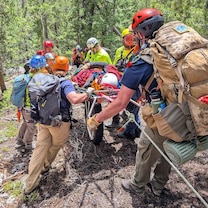10 infants in California neonatal intensive care unit test positive for antibiotic resistant superbug
Infections were reported over eight months.
— -- County and hospital health officials are investigating how 10 infants tested positive for a dangerous bacteria while they were being treated in the neonatal intensive care unit at the University of California Irvine Medical Center.
The 10 infants were reported to have tested positive for the same strain of methicillin-resistant Staphylococcus aureus (MRSA) between August 2016 and March 2017, according to a statement sent to ABC News by UC Irvine Medical Center. All infants were treated and none died after the bacteria was detected.
MRSA bacteria can occur naturally in nature and approximately 2 out of 100 people carry MRSA usually on the skin or in the nose, according to the U.S. Centers of Disease Control. The bacteria is notorious for being spread in healthcare settings, where it can travel from contaminated wounds to other patients via healthcare providers, according to the U.S. Centers for Disease Control and Prevention.
In February, the World Health Organization declared MRSA one of the 12 families of bacteria that "pose the greatest threat to human health," calling for efforts to urgently produce new antibiotics that can rid patients of the so-called superbugs.
"Antibiotic resistance is growing, and we are fast running out of treatment options. If we leave it to market forces alone, the new antibiotics we most urgently need are not going to be developed in time," Dr Marie-Paule Kieny, WHO's Assistant Director-General for Health Systems and Innovation said in a statement.
Yesterday, the UC Irvine Medical Center reported that they worked with the Orange County Health Department to heighten their infection prevention measures after the department found that there was a common strain of MRSA in the patients in December, but no source has been found at this point.
"Its presence on a person does not necessarily cause illness and, as in this case, it’s not always possible to find the source," UC Irvine said in a statement to ABC News.
Although 220 staff underwent a process to pre-emptively kill any potential MRSA bacteria with antiseptic soap and ointemnt, the newest MRSA case was detected in March. Four staff members tested positive for MRSA in January but all are currently negative, according to the hospital statement.
"With the most recent MRSA case in March, we have repeated deep cleaning, continued attention to hand hygiene and repeated staff decolonization. We are currently testing staff to determine the effectiveness of this decolonization."
Dr. Amy Edwards, a physician specializing in pediatric infectious disease at UH Rainbow Babies and Children’s Hospital, said that since MRSA can occur naturally on the skin it's virtually impossible to keep it out of all hospitals settings.
"Up to 10 percent of the population is colonized, you can't decontaminate the entire world," she said.
Additionally, she said completely decontaminating an area with patients can be a struggle as "it's hard to get every little bit of bacteria."
Edwards said doctors and nurses are generally extremely vigilant with infants in the NICU because they are more prone to all kinds of infections due to a weak immune system and invasive procedures.
"Their skin isn't always intact, they often need invasive surgery," she explained. "Anything that breaks the skin barrier is going to increase risk," of infection.
UC Irvine Medical Center has also launched multiple initiatives to prevent any further spread of the bacteria. These initiatives include screening all infants for MRSA during admission and on weekly intervals, using antibacterial noise ointments and antiseptic soaps on infants and ensuring staff and visitors clean mobile devices with alcohol wipes before putting them into plastic bags.
They also closed one of the two NICUs to new patients to better protect the newborns from possible infection.
"Our goal is to ensure the safety of our patients and eradicate the presence of any drug-resistant bacteria in our neonatal intensive care unit (NICU)," hospital officials said in a statement.
ABC News' Julie Sone contributed to this report.




